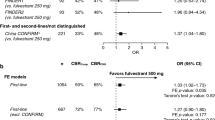Abstract
Purpose
Fulvestrant (‘Faslodex’) is an oestrogen receptor (ER) antagonist with no agonist effects. The drug was administered to heavily pre-treated patients with advanced breast cancer (ABC). Patients received Fulvestrant after disease progression (PD) on a previous endocrine treatment or as maintenance treatment after chemotherapy.
Material and methods
Fifty-seven postmenopausal women with ER and/or progesterone receptor-positive ABC resistant to previous endocrine treatments prospectively received fulvestrant 250 mg via intramuscular injection q 28.
Results
Twenty-seven patients received fulvestrant after PD and 30 received it as maintenance therapy after chemotherapy. All patients received fulvestrant as second-up to eight-line endocrine treatment for ABC. One patient (2%) had a partial response (PR) and 24 patients (42%) had stable disease ≥12 weeks (SD), including 11 patients who had SD ≥24 weeks. Thirty-two patients (56%) had de novo PD. Clinical benefit (CB; PR + SD ≥24 weeks) occurred in 12 patients (21%). Patients treated as maintenance and treated upon PD had 0 and 4% PR, 43 and 41% SD (including 20 and 19% SD ≥24 weeks), 57 and 55% PD, respectively. Overall, median time to progression (TTP) was 3 months. No differences in CB rate (20% vs. 23%), TTP (3 months vs. 3 months) and time to treatment failure (3 months vs. 3 months) were observed between patients receiving fulvestrant as maintenance therapy and those treated at PD on prior endocrine treatment. No grade 2–4 NCI-CTC toxicity was recorded.
Conclusions
Fulvestrant treatment was associated with prolonged CB and was well tolerated in this group of heavily pre-treated patients with ABC. The outcomes appeared to be similar for patients treated upon PD and those receiving fulvestrant as maintenance therapy.
Similar content being viewed by others
References
Goldhirsch A, Gelber R (1996) Endocrine therapies of breast cancer. Semin Oncol 23:494–505
Hortobagyi GN (1998) Progress in endocrine therapy for breast carcinoma. Cancer 83:1–6
Buzdar AU, Hortobagyi G (1998) Update on endocrine therapy for breast cancer. Clin Cancer Res 4:527–534
Johnston SR, Martin AL, Dowset M (2005) Life following aromatase inhibitors: where now for endocrine sequencing? Breast Cancer Res Treat 93(Suppl 1):S19–S25
Howell A, Osborne CK, Morris C et al (2000) ICI 182,780 (Faslodex): development of a novel, “pure” antiestrogen. Cancer 89:817–825
Osborne CK, Coronado-Heinsohn EB, Hilsenbeck SG et al (1995) Comparison of the effects of a pure steroidal antiestrogen with those of tamoxifen in a model of human breast cancer. J Natl Cancer Inst 87:746–750
Addo S, Yates RA, Laight A (2002) A phase I trial to assess the pharmacology of the new oestrogen receptor antagonist fulvestrant on the endometrium in healthy postmenopausal volunteers. Br J Cancer 87:1354–1359
Howell A, Robertson J (1995) Response to a specific antioestrogen (ICI 182780) in tamoxifen-resistant breast cancer. Lancet 345:989–990
Howell A, DeFriend DJ, Robertson JF et al (1996) Pharmacokinetics, pharmacological and anti-tumour effects of the specific anti-oestrogen ICI 182780 in women with advanced breast cancer. Br J Cancer 74:300–308
Osborne CK, Pippen J, Jones SE et al (2002) Double-blind, randomized trial comparing the efficacy and tolerability of fulvestrant versus anastrozole in postmenopausal women with advanced breast cancer progressing on prior endocrine therapy: results of a North American trial. J Clin Oncol 20:3386–3395
Howell A, Robertson JFR, Quaresma Albano J et al (2002) Fulvestrant, formerly ICI 182,780, is as effective as anastrozole in postmenopausal women with advanced breast cancer progressing after prior endocrine treatment. J Clin Oncol 20:3396–3403
Howell A, Pippen J, Elledge RM et al (2005) Fulvestrant versus anastrozole for the treatment of advanced breast carcinoma: a prospectively planned combined survival analysis of two multicenter trials. Cancer 104:236–239
Robertson JF, Osborne CK, Howell A et al (2003) Fulvestrant versus anastrozole for the treatment of advanced breast carcinoma in postmenopausal women—a prospective combined analysis of two multicenter trials. Cancer 98:229–238
Franco S, Perez A, Tan-Chiu E et al (2004) Response to fulvestrant in heavily pretreated postmenopausal women: a single-center experience. Breast Cancer Res Treat 88:103–108
Steger GG, Bartsch R, Wenzel C et al (2005) Fulvestrant (‘Faslodex’) in pre-treated patients with advanced breast cancer: a single-centre experience. Eur J Cancer 41:2655–2661
Steger GG, Gips M, Simon SD et al (2005) Fulvestrant (‘Faslodex’): clinical experience from the compassionate use programme. Cancer Treat Rev 31(Suppl 2):S10–S16
Ingle JN, Suman VJ, Rowland KM et al (2006) Fulvestrant in women with advanced breast cancer after progression on prior aromatase inhibitor therapy: north central cancer treatment group trial n0032. J Clin Oncol 24:1052–1056
Robertson JFR, Howell A, Gorbunova VA et al (2005) Sensitivity to further endocrine therapy is retained following progression on first-line fulvestrant. Breast Cancer Res Treat 92:169–174
Therasse P, Arbuck SG, Eisenhauer EA et al (2000) New guidelines to evaluate the response to treatment in solid tumors. J Natl Cancer Inst 3:205–216
Robertson JF, Howell A, Buzdar A et al (1999) Static disease on anastrozole provides similar benefit as objective response in patients with advanced breast cancer. Breast Cancer Res Treat 58:157–162
Vergote I, Robertson JFR, Kleeberg U et al (2003) Postmenopausal women who progress on fulvestrant (‘Faslodex’) remain sensitive to further endocrine therapy. Breast Cancer Res Treat 79:207–211
Acknowledgement
The authors would like to thank Dr Dawn Batty from Complete Medical Communications, who provided medical writing support funded by AstraZeneca.
Author information
Authors and Affiliations
Corresponding author
Rights and permissions
About this article
Cite this article
Catania, C., Ascione, G., Adamoli, L. et al. Fulvestrant in heavily pre-treated patients with advanced breast cancer: results from a single compassionate use programme centre. Breast Cancer Res Treat 106, 97–103 (2007). https://doi.org/10.1007/s10549-006-9481-8
Received:
Accepted:
Published:
Issue Date:
DOI: https://doi.org/10.1007/s10549-006-9481-8




